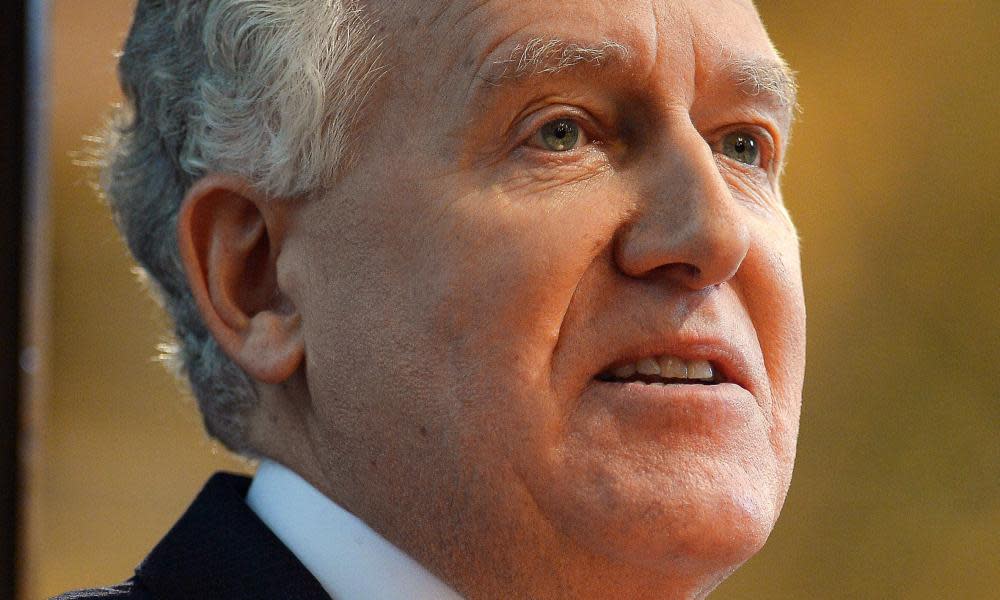Peter Hain: hard Brexit puts Northern Ireland peace process at risk

The government’s push for a hard Brexit could come “at a dangerously high cost” for peace across the Irish border, a former Northern Ireland secretary has warned as the article 50 bill is scrutinised in the Lords.
Peter Hain, who became a peer in 2015, said reintroducing controls on the border might undermine a sectarian peace process which could still “so easily unravel”.
“Frankly, I’m not convinced the government has begun to even grasp the political significance of it,” said the former Labour MP.
Lord Hain has introduced an amendment to the bill which authorises the government to trigger the formal process of leaving the EU, saying the government should “support the maintenance of the open border” as part of Brexit.
The amendment is supported by Paul Murphy, Hain’s predecessor in the Northern Ireland office, and John Alderdice, a former speaker of the Northern Ireland assembly, both of whom are now also in the Lords.
Hain said a hard Brexit “could do profound damage” to the basis of the Good Friday agreement if it restricted use of a border across which about 30,000 people pass each day.
An open border was “politically totemic” to republicans in Northern Ireland, he said, and while political union did not exist, both sides of the border were “becoming united in everyday life”.
“And that is something welcomed by unionists as well, secure in the knowledge that there can be no change in the constitutional position without their consent. Above all it’s a symbol of the normalisation of relations between the two parts of Ireland,” Hain said.
“The government disturbs that at everyone’s great and grim peril. And those who maintain that because the prime minister said she does not want to return to a hard border then it won’t happen, should be aware that the Irish government – which doesn’t want a hard border either – has nevertheless, as a contingency measure, begun identifying possible locations for checkpoints along the border with Northern Ireland in the event of a hard Brexit.”
He continued: “I don’t say that we’ll go back to the murder and mayhem of the Troubles, but I do insist that the process could so easily unravel.
“If the referendum means Brexit at any price, it may well be at a dangerously high cost for the Northern Ireland peace process.”
Speaking in support of the amendment, Lord Alderdice said he feared Brexit was being pursued without proper consideration of the needs of Northern Ireland, or of Scotland and Wales.
“Being the prime minister of the United Kingdom is not just about being the prime minister of England and a few add-on bits,” he said.
Hain’s amendment is not supported by the Labour leadership in the Lords and so is unlikely to be passed. But it illustrates the scale of worries about the issue.
David Trimble, who was jointly awarded the Nobel peace prize for his efforts in agreeing the Good Friday deal, said he felt Hain’s amendment was “unnecessary”, arguing that Theresa May had supported a continued open border.
“The prime minister does that, as of now,” the now Conservative peer said. “It’s in the white paper.”
The debate came as the Lords’ scrutiny of what is officially called the European Union (notification of withdrawal) bill reached the report stage.
On Wednesday, peers are expected to vote on a Labour-led amendment calling for the government to unilaterally guarantee the rights of EU nationals in the UK after Brexit. Labour sources in the Lords say they are confident this would be passed if voted on.
The junior Northern Ireland minister Lord Dunlop said the government was committed to keeping an open border and the “deeply integrated” two economies.
“Nobody wants to see a return to the borders of the past,” he said. However, Dunlop added, the bill was “a clean and simple bill” only intended to authorise the government to trigger article 50.
Any more details should wait for other legislation, he said, and Hain’s amendment was not needed even though the government agreed with its aims.

 Yahoo News
Yahoo News 
